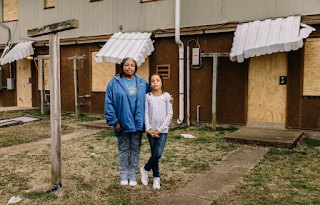 |
| Terri Childs and her daughter near their former apartment in Cairo, Illinois. (ProPublica photo by William Widmer) |
After years of ignoring horrible living conditions in public housing complexes in small towns on the Mississippi River at the southern tip of Illinois, the U.S. Department of Housing and Urban Development addressed the problem last spring -- but its solution may be just as much a hardship to former housing residences.
For years, people who lived in public housing in Cairo and nearby Thebes "were stuck living in aging and neglected buildings with inoperable heat, leaky ceilings, broken windows, mold, mice, roaches, and frequently clogged toilets and sinks," Molly Parker reports for The Southern Illinoisan, in partnership with ProPublica, which recently started an Illinois operation. Parker was selected last year for the ProPublica Local Reporting Network to write about issues related to low-income and federally subsidized housing.
Federal authorities failed to fix the problems in Cairo for years, in
spite of financial reviews and inspections that should have prompted
action. In 2017, HUD announced it would close two complexes each in Cairo and Thebes and help the nearly 500 residents, half of whom were children, find new homes. Residents were offered spots in other public housing units or vouchers to subsidize rent on a non-HUD unit, but there aren't enough affordable rental units in the two towns to house everyone. That means some families must move to other towns, where landlords may not want to rent to families with federal Section 8 vouchers. And some residents who were able to find a new home face increased rent and utility costs. Overall, the shuffle has torn apart residents' communities and their social networks and support systems, Parker reports.
David Omotoso Stovall, a professor of educational policy studies and
African-American studies at the University of Illinois-Chicago, told Parker: "The chances of people ending up in better situations are not great." UPDATE, April 10: HUD says it doesn't have the money to fix up the complexes, but the two senators from Illinois says the decision to close them violates federal law, Parker reports.
No comments:
Post a Comment